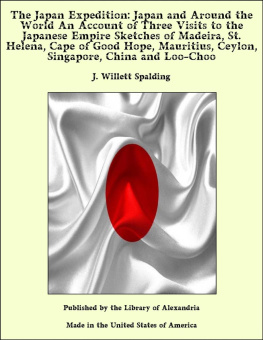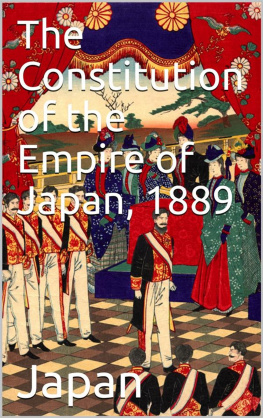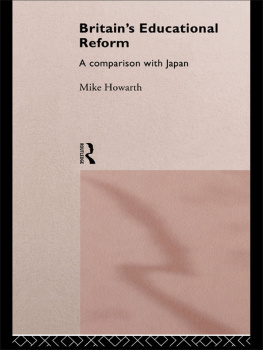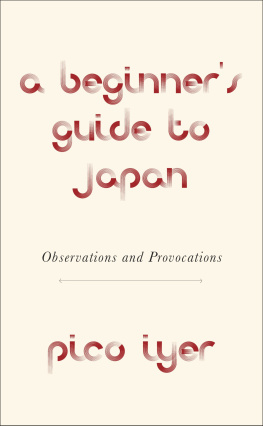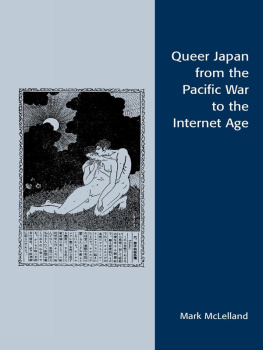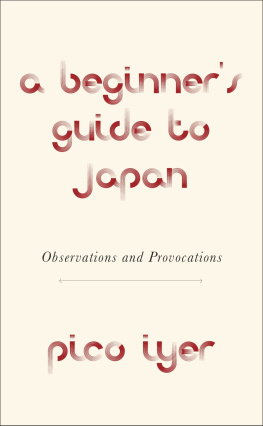LEAVING
JAPAN
Observations on the
Dysfunctional
U.S.-Japan Relationship
Mike Millard
An East Gate Book
First published 2001 by M.E. Sharpe
Published 2015 by Routledge
2 Park Square, Milton Park, Abingdon, Oxon OX14 4RN
711 Third Avenue, New York, NY 10017, USA
Routledge is an imprint of the Taylor & Francis Group, an informa business
Copyright 2001 by Mike Millard. All rights reserved.
No part of this book may be reprinted or reproduced or utilised in any form or by
any electronic, mechanical, or other means, now known or hereafter invented, including photocopying and recording, or in any information storage or retrieval system, without permission in writing from the publishers.
Notices
No responsibility is assumed by the publisher for any injury and/or damage to persons or property as a matter of products liability, negligence or otherwise, or from any use of operation of any methods, products, instructions or ideas contained in the material herein.
Practitioners and researchers must always rely on their own experience and knowledge in evaluating and using any information, methods, compounds, or experiments described herein. In using such information or methods they should be mindful of their own safety and the safety of others, including parties for whom they have a professional responsibility.
Product or corporate names may be trademarks or registered trademarks, and are used only for identification and explanation without intent to infringe.
Library of Congress Cataloging-in-Publication Data
Millard, Mike, 1945
Leaving Japan : observations on the dysfunctional U.S.-Japan relationship / by Mike Millard.
p. cm.
An East gate book.
Includes index.
ISBN 0-7656-0659-3 (alk. paper)
ISBN 0-7656-0660-7 (pbk. : alk. paper)
1. United StatesRelationsJapan. 2. JapanRelationsUnited States. I. Title.
E183.8.J3 M55 2000
303.48273052dc21
00-041290
ISBN 13: 9780765606600 (pbk)
ISBN 13: 9780765606594 (hbk)
For Miwa and Emerson
Photo by Jonathan Drake
Mike Millard is a journalist living in Singapore.
Contents
I am obviously in debt to each of the deeply knowledgeable people appearing in this book, from whom I have learned much but would never pretend to equal.
In addition to those who are quoted or whose works are cited, I would be remiss if I did not thank the others who helped me in every phase of bringing the project to completion.
They include Nobuko Kosuge, Mayumi Maruyama, Mayo Issobe, Takeaki Hori, Makiko Hamada, Keisuke Okada and Senator Ichiji Ishii, all of whom facilitated my introduction to Japanese people, culture and politics, and each of whom in some way provided inspiration for me to write.
I also owe much to my colleagues Michael Watson, Ron Rhodes, Jason Neely, Richard Bill, Elaine Lies, David Russell and Eamonn Fingleton, whose contributions were invaluable from the formation of ideas through reading early drafts of the manuscript.
Professors Michael Barkun, John Nagle, David Bennett and Stephen Saunders Webb of the Maxwell School of Citizenship and Public Affairs at Syracuse University provided me with the academic bedrock on which to build.
Finally, I must especially thank Donald Richie for reading this book in its later stages and making a number of suggestions that helped bring my efforts into clearer focus, and Chalmers Johnson for his consistent support and for generously sharing his profound knowledge of Japan.
I could not have written this book without the help of so many people who taught me everything. For any errors that may appear on these pages, I assume full responsibility and can only say by way of apology that I should have listened more closely to my teachers.
Mike Millard
Singapore
June 1, 2000
The better the state is established, the fainter is humanity.
Friedrich Nietzche
LEAVING JAPAN
I MIGHT HAVE COME ASHORE LIKE some seventeenth-century castaway, like William Adams, the English navigator who was used for his knowledge of the wider world by Japans first shogun, Tokugawa Ieyasu, the consolidator of Japan after Hideyoshi had largely conquered and united it.
The only thing Japanese that had ever caught my interest was Buddhism, perhaps because some Beat-generation writers with minds on fire had transmitted a passion for freedom ignited by pushing the boundaries of American life, finding inspiration in jazz, in Emersons essays on individualism, in the open-road poetry of Walt Whitman, and in the Buddhist thought of Japan.
I left San Francisco on a one-way ticket and plied my trade as a writer and editor in Tokyo for more than eleven years, mostly for Japanese companies. I could not help but become aware of problems in U.S.Japan relations. I began to wonder why they existed and what might come of them. I became a student of the situation and my views of the Japanese, of Japans strategic economy and of its relations with the United States, began coalescing. My analysis has been drawn from research, from interviews for stories that I wrote, from conversations with participants in U.S.Japan relations as well as observers, from books and articles, from the fabric of daily life, from experiences in the newsroom, on the train, in bars, and elsewhere. You hold in your hands the condensation of many years into a volume of modest size. But first, a brief sketch of the Japan that I and many of my colleagues who worked for Japanese companies encountered.
After a couple of years, you realize that you can never be at home in Japan in the way that a Japanese could in America. The relationship is not reciprocal. You can never participate fully as a professional in the Japanese workplace, whether as a journalist, an academic, or an English teacher, which are some of the few visa categories allowing foreigners to reside in Japan. You will be kept at a distance, not tenured, permanently employed, or made to feel welcome for the long term. You will be used for your skills as a necessary evila kind of foreign devil. If you ask why this is, they will probably tell you it is not an exclusionary or a racist attitude, it is just that you do not fit in. They will say you do not speak their language, and if you learn to speak it they will say you do not read it. If you learn to read the thousands of written characters, or kanji, as a good many foreigners have these days (I am not among them), they will find another reason, but you will still be excluded, as the American scholar Ivan Hall has eloquently documented in his book, Cartels of the Mind.
In asking the Japanese to dismantle their cartels of the mind, nothing is so effective for starters as sheer exposure. The vested interests these structures serve and the fortress mentality that sustains them must first be driven from the shadows of anonymity, where they feed and luxuriate on the assumption that the outside world doesnt know, or if it did, wouldnt care.1


